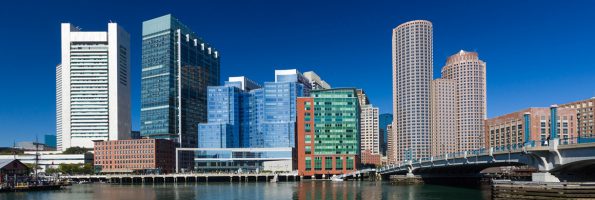Boston University Consumer Study Finds Positives in Geo-Targeting

It’s been written that traditional direct mail coupons are a “lose-lose scenario” for two competing brands as they effectively negate the possibility that one company can profit over the other. Beyond the profit margin, coupons are out-of-time, out-of-place propositions that don’t take into account our busy, mutable schedules.
Which Boston MBA Programs Offer the Best Return on Investment?

A stellar résumé, well-targeted recommendation letters, and a strong GMAT score may be vital in earning a spot in your dream business school, but one factor that may weight heavier than everything else is the return on investment. Will the school be worth it? How successful are its alumni? How do employers feel about the school name on a diploma?
A person needs to know that their time—and money—will amount to success and a well-paying job. If Boston‘s the city for you, here are the top four business schools if return on investment, or ROI for short, is on your mind.
#1) Harvard Business School
This prestigious university might come as no surprise as first on our list. But it’s not at the top for nothing. Home of one of the world’s first MBA programs, Harvard Business School is a bit separate from the main campus itself in Cambridge, sitting in Boston’s Allston neighborhood.
Unsurprisingly, the program’s ROI is highly-competitive. Tuition at HBS currently costs around $72,000. That’s a lot more than how much a student might pay per year elsewhere, even without considering the usually stellar track record of HBS grads. Graduates in 2016 had median base salaries of $135,000 with a median signing bonus of $25,000. Sixty-eight percent received a signing bonus. That’s a lot of people. And it’s a pretty sure thing. Work hard at Harvard, and it appears you’re sure to reap the benefits.
READ MORE: HBS Announces Largest-Ever Scholarship Donation
#2) Sloan School of Management – MIT
At MIT’s Sloan School of Management, students can feel certain they’ll succeed after graduation. Individuals, of course, may determine their own success, but Sloan knows how to get its students there. The school is known for its business offerings, particularly its global Sloan Fellows program. There, students can walk away with an executive MBA in just one year. Sloan has been growing its educational base since 1914 when its “Engineering Administration” course set a business tone in the technical school.
Currently, tuition at MIT Sloan sits at $71,000, which isn’t much less than Harvard’s. The median base salary for 2016 graduates was $125,000, with salary ranging anywhere from $40,000 to $200,000.
The business school can provide a myriad of opportunities, especially through its various centers and initiatives, which focus on, science, innovation, medical research, and more.
#3) D’Amore-McKim School of Business – Northeastern University
This business school is tucked in Boston’s arts neighborhood, the Fenway Cultural District. Northeastern University offers multiple campuses, but the MBA programs take place at the D’Amore-McKim School of Business.
MBA students pay the same tuition for classes online or in person: $1,560 per credit hour. For a year, that’s roughly $28,080—significantly less than the aforementioned Harvard and MIT. So if you’re not ready or can’t afford to drop a bunch of money on costs, D’Amore-McKim might be the program for you. Its graduates go on to make $81,000 a year, which is nearly 66 percent more than yearly tuition. The top base salary for recent alumni is $115,000.
These employment opportunities come quickly: 96 percent of D’Amore-McKim alumni accept a job offer within three months of graduation.Companies like Zipcar and Hasbro, Inc., hired graduates last year. Resources like the Graduate Career Center and the school’s clubs can help students make it. Clubs like the Emerging Markets Club gives students the hands-on experience they need to succeed.
#4) Questrom School of Business – Boston University
The Questrom School of Business at Boston University offers a variety of MBA programs. The first was launched in 1925, but the school went on to add an executive MBA, public and nonprofit MBAs, evening MBAs, and health sector MBAs.
A full-time MBA tuition costs $51,916 at Boston University. The prices vary depending on which program a student decides is right for them, which contributes to the school’s placement on the list. For example, the executive MBA costs nearly double the traditional MBA rate. However, alumni do go on to make that money back. In 2016, graduates’ mean base salary was $100,820. About 92 percent of graduates accepted a job offer just three months after earning a degree, with nearly all taking an internship. Places like General Motors and IBM hired recently hired Questrom grads.
You could be next. But it’s up to you to decide what school makes the most sense for you. You’re onto something with Boston though. The seafood will never end, and the accents will always entertain. Find the city’s best executive MBA program or explore its one-year MBAs if you need just a little bit more info.
The Boston vs. Washington DC Full-Time MBA Battle

Choosing the right city for your MBA program can be a bigger choice than it seems: given the connections and opportunities an MBA typically provides, the city where you pursue your degree will likely be the same city where your career begins and grows.
Even if you’ve narrowed down your business school search to the east coast, you’ve still got a number of top metros to choose from. So regardless if you’re looking south to Washington, D.C., or north to Boston, both metros will likely offer a number of benefits for up-and-coming business professionals.
Both D.C. and Boston offer a number of exceptional full-time MBA programs, giving a prospective MBA a lot to think about. Below, we’ll break down some of the biggest differences in location, programs, and job placement for each metro.
Location
As long as you can deal with snow, Boston is a multicultural hub of business that covers a variety of industries, from startups to high tech and the creative economy. Massachusetts is home to 30 Fortune 500 companies, with massive corporations like General Electric and Liberty Insurance Group centered within Boston. However, as the city continues to grow and improve, the cost of living is also climbing, with Boston ranking eight overall as the most expensive city in the United States.
If you are looking to use your business acumen in a government setting, there are few places better to go than the nation’s capital. With fifteen companies making the Fortune 500 list in the Washington DC metro area, there are a number of opportunities for MBAs to put their business skill to work, even outside of government agencies, with companies like Wal-Mart and Exxon Mobile leading the list. However, DC even outranks Boston for cost of living, ranking as the third most expensive city in the United States.
Washington Full-Time MBA Programs
The Washington DC metro has more than 35 higher education institutions with post-bachelor programs for business students. Featuring some of the top ranked MBA programs in the country, many of the DC programs focus on professional integrity and ethics, attempting to reflect its location in the country’s capital. Many of the MBA programs here also focus on placing business within a global context, encouraging students to gain real-world experience outside of the classroom to gain a better understanding of the global business community.
Full-Time MBA Programs in DC Include:
- George Mason University School of Business
- George Washington University School of Business
- Kogod School of Business – American University
- University of Maryland R.H. Smith School of Business
Boston Full-Time MBA Programs
The Boston metro features some of the top ranked and oldest business schools in the world, which focus on placing students within the global economy and encouraging study abroad opportunities that allow students to get hands-on experience in international business. Given Boston’s reputation as a growing business hub, many of the top jobs in the city may require an MBA.
Full-Time MBA Programs in Boston include:
- Sloan School of Management – MIT
- Harvard Business School
- Questrom School of Business – Boston University
- Sawyer Business School – Suffolk University
- Carroll School of Management – Boston College
Cost of MBA Programs
Cost can be an important consideration when choosing a degree program. The average tuition costs of the Washington DC programs mentioned above is roughly $82,090, though the number may be slightly less for local students. In Boston, the range may be slightly higher. Harvard Business School can cost up to $122,000 per year, but other quality programs in the Boston metro can also be found as low as $91,040.
Job Placement and Salary
The cost one is willing to spend on an MBA is often largely determined by the potential salary that can be made after obtaining the degree. Given that both Boston and DC are among the U.S. cities with the highest cost of living, salary may be an important determination in selecting a city to start your career. Thankfully, both cities offer the chance for high earning potential. According to PayScale, Boston MBA graduates can earn anywhere from $53,725 on average to $173,940. In Washington DC, where there is a slightly higher cost of living, salaries can range from $58,402 to $147,715.
Getting Paid: Highest MBA Salaries in Boston

“Step up to get your rep up,” goes the old saying. Reputation is important in the business world and that extends to where you matriculate. Perhaps the most pressing question on the minds of the b-school-bound is: “What does the paycheck look like after graduation?” Got another plan in mind for paying off those loans?
In Search Of The Best Boston Executive MBA Programs

Are you a working professional in the Boston metro who wants to really start climbing the corporate ladder? Do you have significant managerial experience, and think you’re ready to take the next step and assume a leading role in your organizations. Then a Boston Executive MBA (EMBA) may be what you’re looking for. Continue reading…
BU Professor Explores Consumer Choice Accuracy

Boston University’s Questrom School of Business recently looked into a new study published in the Journal of Health Economics that explores how standardized health insurance plans affect consumer choice.
